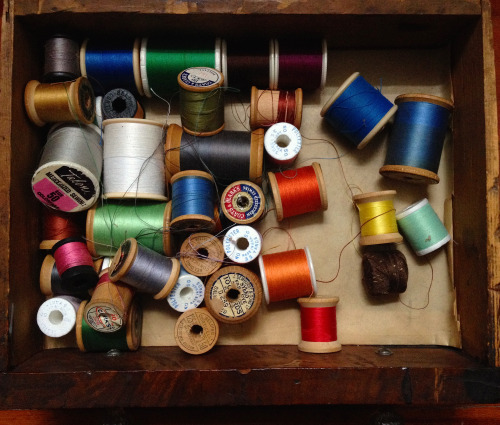Here’s an obviousness: moving is exhausting. You wake up one...

Here’s an obviousness: moving is exhausting. You wake up one morning in the home you’ve had, and that night go to sleep in an echoey and unfamiliar new room, aching and surrounded by boxes. It’s not the shift of turtle shells that’s so tiring, though adjustment has a subtle way of wearing one out. More so, it’s that the process forces you to lay your hands on every object you own. It’s a sort of time travel, a confrontation with all the stages of your living.
Two weeks ago, I packed my belongings in the span of some painful days. In doing, I sped backwards and forwards through time. Here, in my hands, a drawing from when I was eight years old: a round lump of baby on the grass, SAM, my little brother’s name written above with an arrow pointing to him, tears shooting out of his eyes; he was scared! To the right of him a giant tiger approached, fangs dripping blood; me, older sister, in the far right corner of the drawing, arms up, yelling NO, NO. Into a box it goes, not without thoughts of what my eight-year-old self was thinking about my new small brother and tigers and vulnerability and protection.
The next moment I’m holding a passed note from middle school with Lindsay about a crush on Robbie and whether we’d scrimmage the boys team at soccer practice that night. We were in Mrs. DeMerritt’s science class, and it dredges the memory that curly-haired Mrs. DeMerritt did not once, during the whole of the school year, wear the same outfit twice. Do I save this note? Yes. Because it triggers memories that maybe I’ll need again someday to access. The charged thrill of playing against the boys at soccer practice, the sanctioned press against them for the ball, see-your-breath chill in the dim evening air on the fields behind Wheelock School. The disbelief that someone could own a hundred and eighty dresses.
I touch high school notebooks, college notebooks. Some stay, some discarded. I am in a dingy anarchist-run coffeeshop in West Philadelphia reading Plutarch, lonely, nineteen, having just been introduced to chai. I flip through stacks of photographs. I trash an entire photo album of travel in Europe with a former boyfriend who I still, fourteen years later, wish ill. I save one photograph from Norway. It has no people in it. Here I am at eleven, at twenty-four, at seventeen, at thirty. Time pounds and crashes like waves swollen in a storm. Here are my brothers, my parents, my friends, my loves. Some of whom remain, some of whom have turned to ghosts, not from death but other sorts of absences. Remember, remember, ache, and long.
Here, unpacked, in my new home, which doesn’t feel yet like home, I am surrounded by myself. My life feels distilled, concentrated, in a way that’s burdensome, oppressive, and uncomfortable. Much of my furniture – desks, bookshelves, tables, a sofa, my bureau – comes from houses I grew up in. The objects are threads that tie me to past places, past times, past people. And some of these pieces were in houses where my mother grew up, in houses where my grandmother grew up, belonged to family members long-dead I never knew. I feel the weight of that history as I look around. How do we escape ourselves?
In an old sewing table that I haven’t found a place for, I open the small drawers. One is filled with spools of thread. In another, scraps of fabric, an envelope labeled in neat cursive I don’t recognize, piece from blue velvet couch. Whose? I wonder. Where? I remove the swatch, rub it between my fingers, put it to my nose to smell. Dust, time. I find below the fabric another envelope. Inside is a thin slab of smooth rock, about the size of a maple leaf, brown, vaguely heart-shaped, with a darkness in the center, deep and galactic. Held up to the window, light shines through webbed spots. The typed letter that accompanies it, dated October 14, 1983, explains more. Addressed to a Dr. Shneidman, Professor of Thanatology, it explains that the piece is a fossilized cross section slab of the spinal cord of a whale. I hold it, look again. How old? I wonder. How long gone? Here in my hand, its life is distilled and condensed by time, relic, remains. Prehistoric. A different sort of weight of years descends, vast, absorbing, incomprehensible, and I find I do not want it in my hands. And there on the table, a letter addressed to a professor of the study of death. What have I found? What have I lost? I fold the letter around the fossil, slip them back into the envelope, bury it at the bottom of the drawer. And I return to the spools of thread and am astonished how strands so thin can help mend holes, make seams, sew things back together. Our patchwork selves, time threaded.



